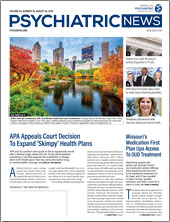A federal district court ruling issued last month allows the Trump administration to expand the sale of short-term, limited-duration health insurance (STLDI) plans that are not required to comply with the Affordable Care Act’s coverage protections. APA responded swiftly to the news, filing an appeal of the ruling with six other health organizations just days after the ruling.
“This ruling could be catastrophic for many Americans with mental illness or substance use disorders,” said APA President Bruce Schwartz, M.D. “These patients have complex medical needs and rely on strong, predictable insurance protection and care. As a result of this ruling, many will suffer and may end up in mental health crises seeking care in emergency rooms as well as incurring great personal financial costs.”
In addition to APA, the coalition named in the appeal includes the Association for Community Affiliated Plans, National Alliance on Mental Illness (NAMI), Mental Health America, AIDS United, National Partnership for Women and Families, and Little Lobbyists. These groups represent a broad array of insurers, health care professionals, and consumer groups that advocate for patients, particularly those with preexisting conditions and chronic illnesses. The plaintiffs hope for a swift ruling on the legality of short-term plans ahead of the 2020 open-enrollment period that begins in November.
“We will continue to fight on behalf of our patients who are entitled, by the Affordable Care Act [ACA], to comprehensive health coverage,” said APA CEO and Medical Director Saul Levin, M.D., M.P.A.
The court ruling upholds a final rule issued last year by the Departments of Labor, Treasury, and Health and Human Services (HHS) to allow short-term health insurance plans to offer coverage for up to 12 months, with renewals possible for up to 36 months. It took effect last October and reversed an Obama-era rule that limited these short-term insurance policies to no more than three months and made them nonrenewable (
Psychiatric News).
Risks of Short-Term Plans
STLDI plans often exclude health benefits mandated as “essential” by ACA, such as mental health and substance use disorder services, emergency services, prescription drug coverage, and hospitalization coverage, according to a 2018 review of STLDI plans by the Kaiser Family Foundation. Rates for short-term health plans vary widely, but they typically cost less because they offer less insurance protection. For example, monthly premiums for a short-term plan in Chicago ranged from $55 to $573 a month, compared with $305 a month for the lowest- cost, ACA-compliant plan.
Unlike ACA-compliant plans, STLDI plans can deny coverage due to preexisting conditions, retroactively cancel coverage for certain medical claims, and surprise enrollees with huge bills because of a lack of in-network providers, according to an assessment by the Urban Institute, a nonprofit research institution. Short-term plans can pose risks to consumers who mistakenly believe that they are as comprehensive as ACA-compliant plans. Marketing websites and brokers selling short-term plans provide limited information on benefits and plan limits and push consumers to make purchasing decisions quickly over the phone, according to the Urban Institute.
Last September, APA and the same coalition filed a lawsuit asserting that the short-term plan rule circumvents congressional intent by creating an alternative individual health insurance marketplace beyond the reach of the ACA. The AMA filed a friend-of-the-court brief in support of the lawsuit (
Psychiatric News).
A major concern about these plans is that they will incentivize healthy individuals to purchase the cheaper, short-term policies over buying comprehensive, ACA-compliant plans, leading to greater instability in the marketplace and raising the cost of comprehensive coverage for people who have serious health conditions.
States Take Action Against Plans
Senior District Judge Richard Leon for the U.S. District Court for the District of Columbia granted summary judgment July 19 in favor of the administration’s rule, writing that there is insufficient evidence to show that the rule will “caus[e] any meaningful number of individuals to leave the Exchange markets and purchase STLDI plans.” Judge Leon also concluded that while the potential impact of the rule is minimal, it would provide “undeniable benefits” by providing a lower-cost insurance option for individuals who drop their comprehensive coverage.
About 200,000 individuals are projected to drop their comprehensive health insurance coverage this year in favor of short-term plans, according to federal estimates contained in the 2018 rule. Enrollment in short-term plans is expected to climb by 600,000 by the end of the year.
In response to the rule, several states have taken steps to ban or limit short-term plans or to add coverage requirements for these products. California, Hawaii, Massachusetts, New Jersey, New York, and Oregon are among the states that have banned or limited the sale of short-term plans.
Acting NAMI CEO Angela Kimball called the federal court rule a step in the wrong direction. “It lets junk plans compete with comprehensive health insurance even though they don’t have to provide the same level of mental health coverage—or any mental health coverage at all,” she said. “This undermines the very intent of mental health parity.” ■
The court ruling is posted
here. The APA press release, “7 Health Organizations File Appeal Challenging Decision on Short-Term, Limited-Duration Junk Insurance Plans,” is posted
here. The Kaiser Family Foundation report, “Understanding Short-Term Limited Duration Health Insurance,” is posted
here. The Urban Institute’s report, “The Marketing of Short-Term Health Plans: An Assessment of Industry Practices and State Regulatory Responses,” is posted
here.
